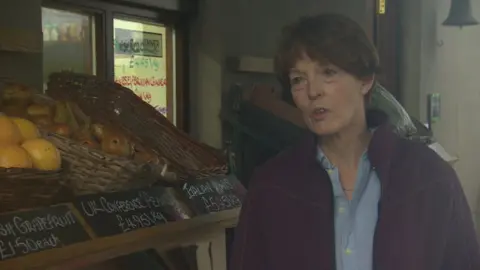Brexit: Supply problems for NI supermarkets being 'overcome'
 Pacemaker
PacemakerSupply problems for NI supermarkets are being overcome, a retail industry representative has told MPs.
There have been shortages of some products in supermarkets across NI.
It comes as retailers grapple with post-Brexit arrangements for importing food products from GB.
The problems were an "inevitable consequence" of the lateness in finalising the new trade arrangements, according to Andrew Opie, director of the British Retail Consortium.
But he warned problems would re-emerge if further new certification requirements are introduced in April.
"We did not get the final confirmation of how products could move until 31 December for a 1 January start," said Mr Opie.
"Therefore some products had more of a problem or were being held back for supply into Northern Ireland.
"Those shortages have been overcome now, pretty much."
Organic problems
Meanwhile, the government said it would soon have a solution for issues being faced by small retailers struggling to get deliveries from Great Britain.
Patricia Gilbert from Ballylagan Organic Farm in Belfast said she has been left with a "big problem".
She was told just before Christmas her GB suppliers would not be shipping in January.
"We then got an email from one of our suppliers about what would be put in place to get good moving across the Irish Sea, but at the end it said there would be no organic produce as it was just too much of a problem," she told BBC News NI.

Every organic item that leaves GB for NI has to have a certificate of inspection, meaning the wholesaler has to go online and enter every item code.
That then needs to be approved by a certification body like the Soil Association and then in Northern Ireland a certified importer must confirm the goods have been received.
"It's such an onerous requirement you can understand why our organic wholesalers are reluctant," she said.
"We sell about 1,000 organic lines and I cannot go into Belfast to source them. I have tried in the Republic of Ireland and have not been able to.
"I really am reliant on GB for most of the organic produce apart from what we produce ourselves.
"The current system is based on the assumption you're sending one container - it isn't set up for sending pallets of maybe 200 lines."
'Distribution nightmare'
Hauliers are also facing problems moving their loads.
Paul Jackson, group commercial director at McBurney Transport, said last week was "horrendous" and things had not improved much.
"We had drivers 36 plus hours in Dublin. The facilities for them were poor. The Irish system is down this afternoon again so we cant release reference numbers," he told BBC's Evening Extra programme.
"We probably have about 75 trailers sitting in our Liverpool depot wanting to ship across into Dublin that can't move and about 35 to 40 in our Penrith depot caught again."
He said a sea rather than land border had caused "confusion".
"It's an absolute distribution nightmare at the moment - it's not a teething problem.
"The governments need to relax this for at least a grace period of six months and allow suppliers in the UK and the island of Ireland to comply with this paperwork nightmare.
"You only need a 24 hour storm on the Irish Sea and you will run out of trailers and supply and supermarket shelves will be lighter," he added.
 Pacemaker
PacemakerMeanwhile the UK's major supermarkets have warned the government that if further new certification requirements for GB-NI food products are introduced in April the system will become "unworkable".
Since 31 December Northern Ireland has remained a part of the EU's single market for goods while the rest of the UK has left.
That means food products entering NI from GB need to be professionally certified and are subject to new checks and controls at ports.
A three-month "grace period" means that supermarkets currently don't need to comply with all the EU's usual certification requirements.
The supermarket chief executives said if the grace period expired without a long-term solution the problems will get worse.
A government spokesman said: "The grace period for supermarkets and their suppliers is working well, goods continue to flow effectively between Great Britain and Northern Ireland and we are working intensively with industry as new requirements come in."